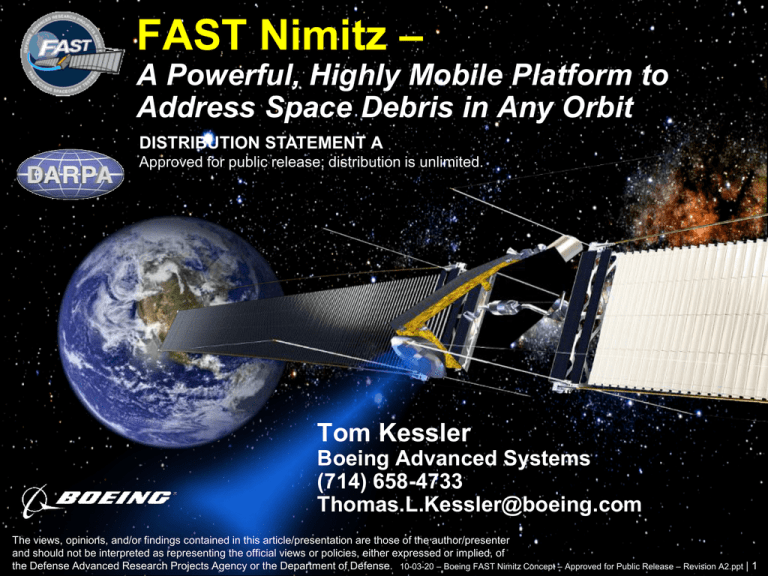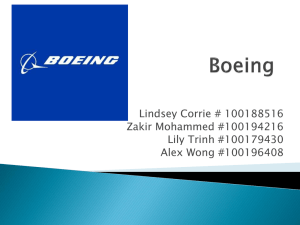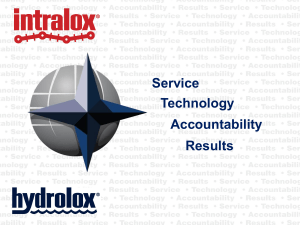
FAST Nimitz –
Integrated Defense Systems
Phantom Works
A Powerful, Highly Mobile Platform
to
Address Space Debris in Any Orbit
DISTRIBUTION STATEMENT A
Approved for public release; distribution is unlimited.
Tom Kessler
Boeing Advanced Systems
(714) 658-4733
Thomas.L.Kessler@boeing.com
The views, opinions, and/or findings contained in this article/presentation are those of the author/presenter
and
should
beAllinterpreted
Copyright
© 2009not
Boeing.
rights reserved. as representing the official views or policies, either expressed or implied, of
the Defense Advanced Research Projects Agency or the Department of Defense. 10-03-20 – Boeing FAST Nimitz Concept – Approved for Public Release – Revision A2.ppt | 1
Approved for public release, distribution unlimited
Space Debris Is An Increasing Threat
to Both GEO and LEO Operations
Integrated Defense Systems | Phantom Works
About 40% of ground-trackable space debris come from explosions, now
running at four to five per year.
Collisions will exceed explosions as a source of new debris within 20 years
Collisions between live spacecraft and other objects can be mitigated by
better tracking
First priorities should be to reduce threats of
•Upper stage / spacecraft explosions
•‘Dead-on-dead’ debris collisions
2
Copyright © 2009 Boeing. All rights reserved.
Image courtesy of the European Space Operations Centre and Universe Today, 4/11/08
Approved for public release, distribution unlimited
Space Debris is In Many
Inclinations And Altitudes
Integrated Defense Systems | Phantom Works
LEO debris is scattered in inclination,
Right Ascension, and altitude
Cost effective, timely solution requires
that multiple debris objects be engaged
per mission/vehicle
“Traveling Salesman Problem”
– For a given list of cities (debris targets)
and their pairwise distances (delta-V),
what is the shortest possible (least
energy) tour that visits each city once.
Effective space-based solution should have high delta-V
Copyright © 2009 Boeing. All rights reserved.
Data per “History of On-Orbit Satellite Fragmentations – 14th Edition, NASA Orbital Debris Program Office
Image courtesy of the European Space Operations Centre and Universe Today, 4/11/08
3
Approved for public release, distribution unlimited
FAST Program Overview
Integrated Defense Systems | Phantom Works
Fabricate a high power and light weight solar electric array
that can support a wide range of space applications, and
ground test it in a relevant space environment
23.1m
2.25m
Basic FAST 15 KW Solar Wing Building Block
Sunlight
Solar Cells - 12.5:1
Concentration
GOALS
~30 kWe electrical power
>130 W/kg specific power
Scalable to 100 - 1,000 kWe
Mechanical /
Electrical Link
Thermal Conduction
Radiative
Emission
Mirror
Radiator
MCA Solar Performance Characteristics
Copyright © 2009 Boeing. All rights reserved.
4
Approved for public release, distribution unlimited
Key FAST Features
Integrated Defense Systems | Phantom Works
Inherent scalability
• Design is modular, one array (2 wings) yields ~30 kWe
• Modular approach scales up, dimensions by 2X, area by 4X
• Modular: Up to six wings can be flown in tandem for 180 kWe
• Scalable: Doubling wing dimensions yields ~720 kWe
• Future technology will scale up power & reduces mass
• Scaling up dimensions
Potential for > 50% increase in
specific power in next decade
• Advanced solar cells
180 kWe
or
720 kWe
Concept
180
kWe
720
kWe
Equivalent
Acreage
Flexible launch vehicle packaging & interface
• 4X better packaging efficiency than state of the art
• SLV 30 kWe HPGS, packages in
• 1.7m Falcon 1E fairing
• Minotaur IV
• EELV Scaled-up 180 kWe system fits in 5m fairing
Inherently survivable/hardened configuration
Big when scaled up…but not too big
30 kWe Array
in Falcon 1E
• Laser survivability due to MCA geometry
Enables LEO to GEO round trips (RT)
• More radiation tolerant due to shielding of surrounding MCA structure RT time (days) Number of RT
60
13 to 17
• Supports multiple passes through Van Allen Radiation Belt
Copyright © 2009 Boeing. All rights reserved.
100
9 to 11
125
6 to 7
200
4 to 5
5
Approved for public release, distribution unlimited
FAST Enables Very High Power Electric Propulsion
and an Order-of-Magnitude Greater Delta-V
Integrated Defense Systems | Phantom Works
14,000
Ion: 4,000
sec
12,000
Dawn
HET: 2,000
sec
DV (m/sec)
10,000
FAST
DRM1
8,000
6,000
4,000
702
Biprop: 320 sec
2,000
601
0
0
0.1
0.2
0.3
0.4
0.5
0.6
0.7
0.8
0.9
1
Propellant Mass Fraction (Mp/Mo)
FAST spacecraft configurations with useful payloads
offer 9,000 – 14,000 meters/second of delta-V
6
Copyright © 2009 Boeing. All rights reserved.
Approved for public release, distribution unlimited
Boeing Has Demonstrated Fully Autonomous
Rendezvous (with or without client aids)
Integrated Defense Systems | Phantom Works
7
Copyright © 2009 Boeing. All rights reserved.
Approved for public release, distribution unlimited
Orbital Express Demonstrated Fully
Autonomous RPO from 200 KM in to 10 CM
Integrated Defense Systems | Phantom Works
8
Copyright © 2009 Boeing. All rights reserved.
Approved for public release, distribution unlimited
Orbital Express Demonstrated Fully
Autonomous ORU and Propellant Transfer
Integrated Defense Systems | Phantom Works
Northrop Grumman-provided hardware demonstrated
autonomous transfer of hydrazine propellant to and
from the NextSat spacecraft 15 times
– Multiple types of fuel transfers are demonstrated
MDA-provided robotic arm demonstrated
eight battery and computer transfers in
both directions between the Ball and
Boeing spacecraft for both a battery and
a flight computer module
Nimitz itself can be
refueled – further
extending it’s
capability and
improving overall
economics
ORU
9
Copyright © 2009 Boeing. All rights reserved.
Approved for public release, distribution unlimited
Summary
Integrated Defense Systems | Phantom Works
• FAST Nimitz offers revolutionary capability for debris mission
– High Performance – Vast improvement over Bi-Prop propulsion and SOA solar arrays
Metric
Total S/C Power
Delta-V
Bi-Prop
FAST with EP
Advantage
1 kW
30 KW
30x more
1-2 Km/s
9-14 Km/s
5-10x more
– Cost effective - This delta-V can allow removal/supersynching of many large GEO or
LEO debris objects in a single mission
Boeing’s FAST team has or is demonstrating the key Nimitz technologies
–
–
–
–
30 KW High Power Generation System Module
24 - 30 KW electric propulsion system
Fully autonomous Rendezvous & Proximity Operations GN&C systems for space debris
Highly flexible robotic systems developed under FREND & Orbital Express programs
FAST Nimitz can carry multiple payloads to affect space debris of many
types in many useful ways:
– Direct capture/transfer/de-orbit of large debris
– Indirect, non co-orbital deployment of de-orbit systems
– Etc.
10
Copyright © 2009 Boeing. All rights reserved.
Approved for public release, distribution unlimited
Conclusion
Integrated Defense Systems | Phantom Works
As the leading manufacturer of satellites in the
world, Boeing is committed to supporting our
customers critical mission operations in space,
including effective responses to the space
debris issue
Nimitz could deliver, power or otherwise work in
concert with many debris mitigation payloads
We are very interested in collaborating with the
developers of these systems
Please contact me at
–
–
–
–
Tom Kessler
Boeing Advanced Systems
(714) 658-4733
Thomas.L.Kessler@boeing.com
11
Copyright © 2009 Boeing. All rights reserved.
Approved for public release, distribution unlimited
Abstract - Fast Access Spacecraft Testbed (FAST) Nimitz
High Energy Spacecraft for Orbital Debris Removal
Integrated Defense Systems | Phantom Works
This paper describes how a space vehicle utilizing a high-power solar array and equipped
with advanced high-power solar electric propulsion can be fitted with a capturing system
for space debris disposal.
The “NIMITZ” spacecraft, powered by a FAST (Fast Access Spacecraft Testbed) solar
concentrator solar array provides 30 – 180 KW for payload or electric propulsion. The
FAST solar array, being developed by The Boeing Company under a DARPA contract, is
a 30kWe solar concentrator system. When integrated with a space platform equipped
with advanced high-power gridded ion or Hall effect thrusters, the space platform is
capable of 5,000-15,000 meters/sec delta-V. This capability coupled with a robotic arm
with a broad array of end effectors and other capabilities, results in a configuration
capable of capturing and/or disposing of any class of space debris in any orbit from LEO
to GEO.
Also discussed is the ability to intercept debris and utilize exceptional maneuverability,
including the number of objects that can be visited, the time to maneuver between objects,
direct rendezvous and proximity operations for large debris transfer, providing remote
deployment of deorbit packages, and small/medium removal means, all due to high deltaV capability of NIMITZ.
NIMITZ would be cost effective, removing large debris for one value price and
small/medium debris for another. NIMITZ would be timely, removing large debris within
days and small/medium debris within weeks, depending upon specific orbit and payload.
12
Copyright © 2009 Boeing. All rights reserved.









